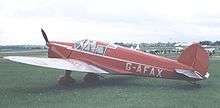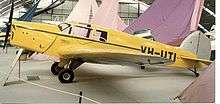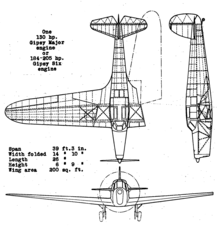British Aircraft Eagle
The B.A. Eagle was a light aircraft manufactured in the United Kingdom during the 1930s. It was a three-seat low-wing monoplane built by the "British Klemm Aeroplane Company" (which later became known as the British Aircraft Manufacturing Co.) Production was limited, with 43 aircraft built.
| Eagle | |
|---|---|
| A preserved airworthy B.A. Eagle 2, 2015 | |
| Role | Tourer |
| Manufacturer | British Klemm / British Aircraft Manufacturing |
| Designer | G.H. Handasyde |
| First flight | 1934 |
| Primary user | private owners |
| Number built | 43 |
Design and development
The British Klemm Aeroplane Company developed the B.K.1 Eagle, a three-seat light aircraft as a follow-up to the British Klemm Swallow, its licensed copy of the Klemm L.25. While similar to the Klemm Kl 32, it was an entirely independent design by G. Handasyde, the chief designer of British Klemm, first flying in early 1934.[1] The Eagle was a low-wing wooden monoplane with a retractable undercarriage. It had an enclosed cabin for the pilot and two passengers. Six of this initial version of the Eagle were built.[1]
As was the case with the Swallow, a revised version was introduced in 1935 when British Klemm was renamed the British Aircraft Manufacturing Co. This version, the B.A. Eagle II had a revised rudder and a deepened rear fuselage. A total of 37 Eagle IIs were built, including a single example fitted with a fixed undercarriage.

Operational history
Eagles were mainly sold to private owners, with a few also being used by flying clubs or as executive transports. Eagles were also used for air racing, with several being entered into the King's Cup Races between 1935 and 1937. Single examples were also entered into the MacRobertson Air Race of 1934 between Britain and Australia and the 1936 Schlesinger Race between England and South Africa. Neither aircraft completed the races.[1]
At the outbreak of the Second World War, seven Eagles were pressed into RAF service in the UK, with two in Australia and one in Kenya,[2] but the undercarriages proved vulnerable in RAF service, with most airframes being written off due to undercarriage failure.[1] Two aircraft survived the war to be flown by civil owners in Australia.
Variants
- B.K. Eagle
- Initial production version, six built.
- B.A. Eagle 2
- Revised production version with modified structure, 37 built.
Operators
- Royal Air Force operated seven aircraft.
Survivors


Two Eagles currently survive.
Specifications (B.K. Eagle 2)

Data from British civil aircraft, 1919-1972 Volume I[1]
General characteristics
- Crew: 1
- Capacity: 2 passengers
- Length: 26 ft 0 in (7.92 m)
- Wingspan: 39 ft 3 in (11.96 m)
- Height: 6 ft 9 in (2.06 m)
- Wing area: 200 sq ft (19 m2)
- Empty weight: 1,450 lb (658 kg)
- Gross weight: 2,400 lb (1,089 kg)
- Powerplant: 1 × de Havilland Gipsy Major 4-cylinder air-cooled in-line piston engine, 130 hp (97 kW)
- Propellers: 2-bladed fixed-pitch propeller
Performance
- Maximum speed: 148 mph (238 km/h, 129 kn)
- Cruise speed: 130 mph (210 km/h, 110 kn)
- Range: 650 mi (1,050 km, 560 nmi)
- Service ceiling: 16,000 ft (4,900 m)
- Rate of climb: 700 ft/min (3.6 m/s)
- Wing loading: 12 lb/sq ft (59 kg/m2)
- Power/mass: 0.054 hp/lb (0.089 kW/kg)
References
- Jackson, Aubrey J. (1987). British civil aircraft, 1919-1972 Volume I (2nd., repr. with corrections ed.). London: Putnam. pp. 168–171. ISBN 0851778089.
- "British Aircraft of World War II – British Aircraft Eagle". Archived from the original on 3 July 2008. Retrieved 9 July 2007.CS1 maint: BOT: original-url status unknown (link)
- Ogden, Bob (2009). Aviation Museums and Collections of Mainland Europe. Air Britain (Historians) Ltd. p. 527. ISBN 978-0-85130-418-2.
- Air Britain News May 2012, p.594
External links
| Wikimedia Commons has media related to British Aircraft Eagle 2. |